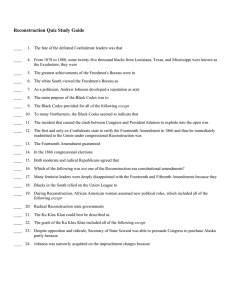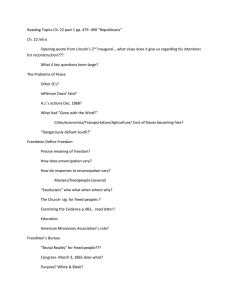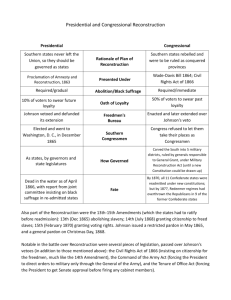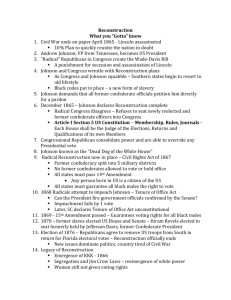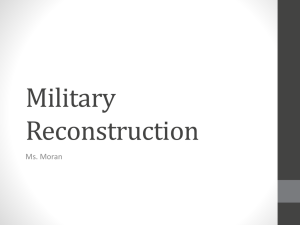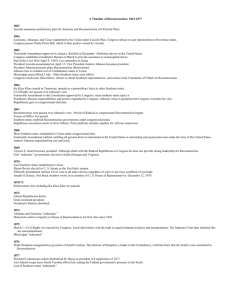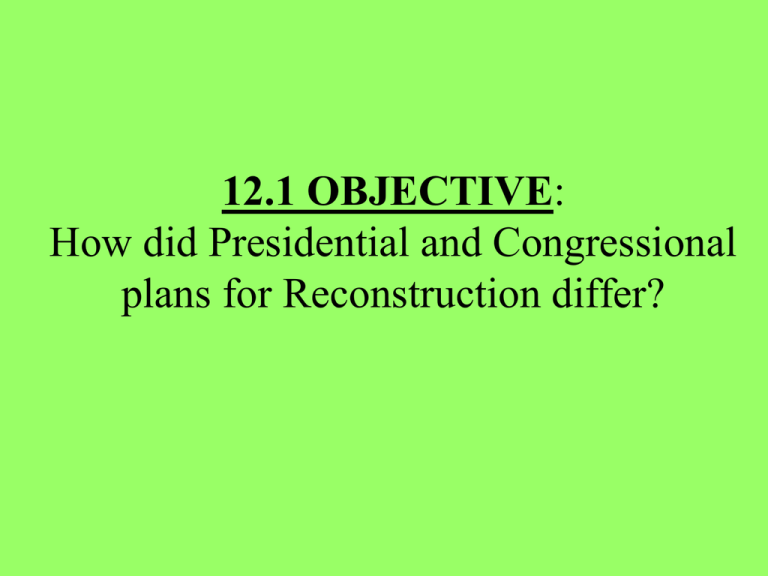
12.1 OBJECTIVE:
How did Presidential and Congressional
plans for Reconstruction differ?
CONTEXT
WHAT TASKS FACE THE NATION AFTER THE
CIVIL WAR ENDS?
1. How should the devastated South be rebuilt?
2. What would be the place/role of the freedmen?
3. How will the conquered states be re-admitted to the
Union?
4. Who will direct/control reconstruction?
5. How could Reconstruction have been done better?
ALSO…
A. How will Southern leaders/traitors be treated?
B. What economic system will replace slavery?
RECONSTRUCTION
•
•
•
•
•
When was Reconstruction?
What is being re-constructed?
How long did it last?
Who did the “constructing”?
Did it work?
Second Inaugural Address
(Prelude to Reconstruction)
Read Lincoln’s second inaugural address:
Answer the following:
What is the tone of the address?
Who is Lincoln addressing?
What strikes you most about the address?
How does it compare to political speeches you have
heard before?
In light if this document, why do some say that
Lincoln’s death was a tragedy for the South?
Second Inaugural Address of Abraham Lincoln
http://www.yale.edu/lawweb/avalon/presiden/inaug/lincoln2.htm
Neither party expected for the war the magnitude or the duration which it has already attained.
Neither anticipated that the cause of the conflict might cease with or even before the conflict
itself should cease. Each looked for an easier triumph, and a result less fundamental and
astounding. Both read the same Bible and pray to the same God, and each invokes His aid against
the other. It may seem strange that any men should dare to ask a just God's assistance in wringing
their bread from the sweat of other men's faces, but let us judge not, that we be not judged. The
prayers of both could not be answered. That of neither has been answered fully. The Almighty has
His own purposes. "Woe unto the world because of offenses; for it must needs be that offenses
come, but woe to that man by whom the offense cometh." If we shall suppose that American
slavery is one of those offenses which, in the providence of God, must needs come, but which,
having continued through His appointed time, He now wills to remove, and that He gives to both
North and South this terrible war as the woe due to those by whom the offense came, shall we
discern therein any departure from those divine attributes which the believers in a living God
always ascribe to Him? Fondly do we hope, fervently do we pray, that this mighty scourge of war
may speedily pass away. Yet, if God wills that it continue until all the wealth piled by the
bondsman's two hundred and fifty years of unrequited toil shall be sunk, and until every drop of
blood drawn with the lash shall be paid by another drawn with the sword, as was said three
thousand years ago, so still it must be said "the judgments of the Lord are true and righteous
altogether."
With malice toward none, with charity for all, with firmness in the right as God gives
us to see the right, let us strive on to finish the work we are in, to bind up the nation's wounds, to
care for him who shall have borne the battle and for his widow and his orphan, to do all which
may achieve and cherish a just and lasting peace among ourselves and with all nations.
RECONSTRUCTION PLANS
LINCOLN’S 1863 PLAN:
WADE-DAVIS BILL, 1864:
• 10% of 1860 voters
• 50% of 1860 voters
must swear allegiance
must swear allegiance
to Union
to Union
• Pledge to abide by
• STRONG safeguards
emancipation
for emancipation
• Focused on pardon of
• Focused on pardon of
individuals by President
states by Congress
* Pocket-vetoed by Lincoln,
exposed split b/w Moderate
and Radical Republicans
How is the war affecting the peace?
Charles Sumner
RADICAL REPUBLICANS
Charles Sumner (left), Senator from Massachusetts, and
Thaddeus Stevens, (right), Congressman from Pennsylvania, led the
Radical Republican faction in Congress. (Portraits from Library of Congress)
What were the Radical
Republicans worried about?
Southern States, with more new seats in Congress,
would control the Federal govt. and halt
Reconstruction.
WHY DID THE SOUTH HAVE MORE POWER
NOW?
Freedmen counted FULLY, no longer 3/5.
Pres. Andrew Johnson
•
•
•
•
•
WHO WAS HE?
VP to Lincoln in 1864 to
attract pro-Union Democrats
to Union Party
Humble origins, selfeducated, self-made man
From Tennessee, slaveowner
Pro-Union, appointed war
time governor
Pro states’ rights
Portrait of Andrew Johnson
(Library of Congress)
JOHNSON’S RECONSTRUCTION
PLAN (1865):
HOW WAS IT DIFFERENT FROM CONGRESS’ PLAN?
• Called “Presidential Reconstruction”
• Same as 10% plan of Lincoln, BUT
• Disenfranchised leading Confederates and Planter
class ($20,000 property or more)
• Special State Convention to repeal secession laws,
repudiate Confederate debts, ratify 13th amendment
*Johnson granted many pardons-enraging Radical
Reps.
OBJECTIVE:
How did Presidential and
Congressional plans for
Reconstruction differ?
• Who had the better plan? Why?
• What problems do you foresee with
Reconstruction?
THE FREEDMEN
• Freedmen’s Bureau lasted from 3/3/1865-1872)
What was the job of the Freedmen’s Bureau?
- distribute food and clothing
- help house
- help educate
- help train for independence
Why did Pres. Johnson veto the Freedmen’s Bureau?
King Andrew
King Andrew
This Thomas Nast cartoon, published in
Harper's Weekly just before the 1866
congressional elections, conveyed
Republican antipathy to Andrew
Johnson. The president is depicted as an
autocratic tyrant. Radical Republican
Thaddeus Stevens, upper right, has his
head on the block and is about to lose it.
The Republic sits in chains. (Harper's
Weekly, 1866)
Copyright © Houghton Mifflin Company. All rights reserved.
REPUBLICAN CONGRESS VS.
“ANDY VETO”
•
•
•
•
•
•
South returns “whitewashed rebels” to Congress
Republicans close Congress to “rebels” Dec. 4, 1865
Johnson recognizes Southern states Dec. 6, 1865
Johnson vetoes extension of Freedmen’s Bureau
Johnson vetoes Civil Rights Bill of 1866
Republicans pass 14th Amendment – DOES NOT
GRANT RIGHT TO VOTE TO FREEDMEN!!!
• Johnson defeated in 1866 Congressional Elections
Johnson Impeached (Almost!!!)
• 1867: Congress passes “Tenure of Office Act”
• Johnson fires Sec. Of War Stanton, a Radical
sympathizer in the Administration
• House of Reps votes 126 to 47 to impeach
• Senate fails to impeach by ONE vote
NOTE: Vice Presidency still vacant – many fear Ben
Wade as President, despite dislike of Johnson
Congressional Reconstruction/
Military Reconstruction: 1867-1877
1867-1869:
• South divided into 5 military districts
• Disenfranchised former Confederates
• Req. South to ratify 14th Amendment
• Req. South to guarantee full suffrage to Freedmen
1870-1877:
• Fifteenth Amendment passed to ensure suffrage
• Federal troops enforce Reconstruction until 1877
Map: The Reconstruction
Copyright © Houghton Mifflin Company. All rights reserved.
Distinguished Colored Men
Distinguished Colored Men
This lithograph from 1883
depicts prominent African
American men, several of whom
had leading roles in Black
Reconstruction. (Library of
Congress)
Copyright © Houghton Mifflin Company. All rights reserved.
Grant Administration
• Grant (Republican) wins 214 electoral votes to
Seymour’s (Democrat) 80
• NOTE: Grant only wins popular vote by 300,000
SIGNIFICANCE: The approx. 500,000 to 700,000
Freedmen’s votes swing election to Grant.
Map: Popular Vote for President in the South, 1872
Copyright © Houghton Mifflin Company. All rights reserved.
• Did we learn any lessons from Reconstruction?
• Compare and Contrast Reconstruction after the
Civil War and reconstruction in Iraq.
• Are there any lessons from the Civil War that
could be helpful in Iraq?

